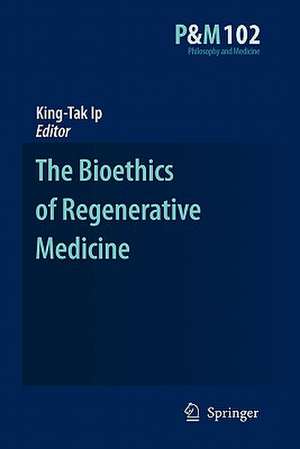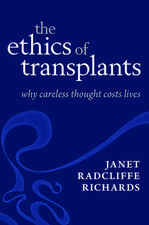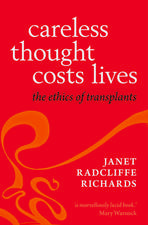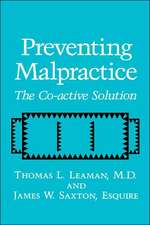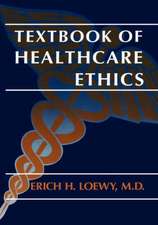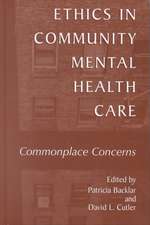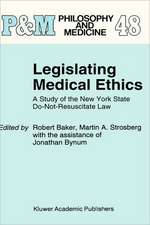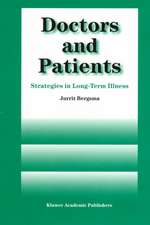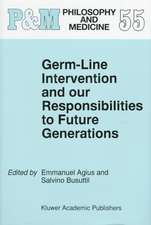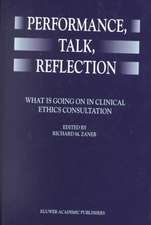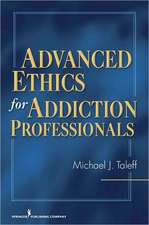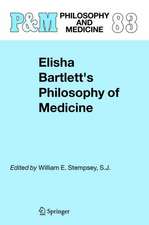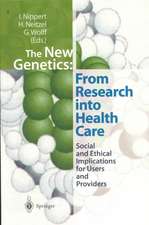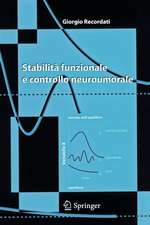The Bioethics of Regenerative Medicine: Philosophy and Medicine, cartea 102
Editat de King-Tak IPen Limba Engleză Paperback – 28 oct 2010
| Toate formatele și edițiile | Preț | Express |
|---|---|---|
| Paperback (1) | 776.40 lei 6-8 săpt. | |
| SPRINGER NETHERLANDS – 28 oct 2010 | 776.40 lei 6-8 săpt. | |
| Hardback (1) | 641.71 lei 6-8 săpt. | |
| SPRINGER NETHERLANDS – 9 ian 2009 | 641.71 lei 6-8 săpt. |
Din seria Philosophy and Medicine
- 18%
 Preț: 3071.11 lei
Preț: 3071.11 lei - 18%
 Preț: 789.52 lei
Preț: 789.52 lei - 15%
 Preț: 644.95 lei
Preț: 644.95 lei - 18%
 Preț: 949.23 lei
Preț: 949.23 lei - 18%
 Preț: 949.23 lei
Preț: 949.23 lei - 18%
 Preț: 948.79 lei
Preț: 948.79 lei - 18%
 Preț: 1223.74 lei
Preț: 1223.74 lei - 18%
 Preț: 1383.94 lei
Preț: 1383.94 lei - 18%
 Preț: 945.30 lei
Preț: 945.30 lei - 5%
 Preț: 1103.95 lei
Preț: 1103.95 lei - 18%
 Preț: 1130.45 lei
Preț: 1130.45 lei - 15%
 Preț: 644.49 lei
Preț: 644.49 lei - 18%
 Preț: 948.61 lei
Preț: 948.61 lei - 15%
 Preț: 645.60 lei
Preț: 645.60 lei - 5%
 Preț: 1154.22 lei
Preț: 1154.22 lei -
 Preț: 395.85 lei
Preț: 395.85 lei - 15%
 Preț: 643.34 lei
Preț: 643.34 lei - 18%
 Preț: 1227.04 lei
Preț: 1227.04 lei - 15%
 Preț: 640.55 lei
Preț: 640.55 lei - 5%
 Preț: 1092.79 lei
Preț: 1092.79 lei -
 Preț: 389.70 lei
Preț: 389.70 lei - 24%
 Preț: 780.11 lei
Preț: 780.11 lei - 15%
 Preț: 642.36 lei
Preț: 642.36 lei - 20%
 Preț: 557.45 lei
Preț: 557.45 lei - 15%
 Preț: 643.16 lei
Preț: 643.16 lei - 15%
 Preț: 639.59 lei
Preț: 639.59 lei -
 Preț: 385.08 lei
Preț: 385.08 lei - 15%
 Preț: 644.95 lei
Preț: 644.95 lei - 15%
 Preț: 642.51 lei
Preț: 642.51 lei
Preț: 776.40 lei
Preț vechi: 946.83 lei
-18% Nou
Puncte Express: 1165
Preț estimativ în valută:
148.63€ • 155.08$ • 124.59£
148.63€ • 155.08$ • 124.59£
Carte tipărită la comandă
Livrare economică 13-27 martie
Preluare comenzi: 021 569.72.76
Specificații
ISBN-13: 9789048180387
ISBN-10: 9048180384
Pagini: 196
Ilustrații: VIII, 186 p.
Dimensiuni: 155 x 235 x 10 mm
Greutate: 0.28 kg
Ediția:Softcover reprint of hardcover 1st ed. 2009
Editura: SPRINGER NETHERLANDS
Colecția Springer
Seria Philosophy and Medicine
Locul publicării:Dordrecht, Netherlands
ISBN-10: 9048180384
Pagini: 196
Ilustrații: VIII, 186 p.
Dimensiuni: 155 x 235 x 10 mm
Greutate: 0.28 kg
Ediția:Softcover reprint of hardcover 1st ed. 2009
Editura: SPRINGER NETHERLANDS
Colecția Springer
Seria Philosophy and Medicine
Locul publicării:Dordrecht, Netherlands
Public țintă
ResearchCuprins
Introduction: Regenerative Medicine at the Heart of the Culture Wars.- Prospect of Being Posthuman: The Metaphysical Roots of the Moral Controversies.- Regenerative Medicine after Humanism: Puzzles Regarding the use of Embryonic Stem Cells, Germ-Line Genetic Engineering, and the Immanent Pursuit of Human Flourishing.- Genetic Manipulation and the Resurrection Body.- Secular Humanist Bioethics and Regenerative Medicine.- Radical Disagreements of Chinese Views on Fetal Life and Implications for Bioethics1.- A Human Embryonic Stem-Cell Research: The Geography of Persistent Disagreement.- Using and Misusing Embryos: The Ethical Debates.- Trading Lives or Changing Human Nature: The Strange Dilemma of Embryo-Based Regenerative Medicine.- Therapeutic Cloning, Respect for Human Embryo, and Symbolic Value.- A Search for a Larger Picture: Regenerative Medicine and the Moral Enterprise.- Medical Biotechnologies: Are There Effective Ethical Arguments for Policy Making?.- Extending Human Life: To What End?.- The Ethics of Regenerative Medicine: Beyond Humanism and Posthumanism.- Virtue In Vitro: Virtue Ethics as an Alternative to Questions of Moral Status.
Textul de pe ultima copertă
Regenerative medicine is rich with promethean promises. The use of human embryonic stem cells in research is justified by its advocates in terms of promises to cure a wide range of diseases and disabilities, from Alzheimer’s and Parkinsonism to the results of heart attacks and spinal cord injuries. More broadly, there is the promethean allure of being able to redesign human biological nature in terms of the goals and concerns of humans. Needless to say, these allures and promises have provoked a wide range of not just moral but metaphysical reflections that reveal and reflect deep fault-lines in our cultures.
The essays in this volume, directly and indirectly, present the points of controversy as they tease out the character of the moral issues that confront any attempt to develop the human regenerative technologies that might move us from a human to a post-human nature. Although one can appreciate the disputes as independently philosophical, they are surely also a function of the conflict between a Christian and a post-Christian culture, in that Christianity has from its beginning recognized a fundamental prohibition against the taking of early human life. Even the philosophical disputes that frame secular bioethics are often motivated and shaped by these background cultural conflicts. These essays display this circumstance in rich ways.
The essays in this volume, directly and indirectly, present the points of controversy as they tease out the character of the moral issues that confront any attempt to develop the human regenerative technologies that might move us from a human to a post-human nature. Although one can appreciate the disputes as independently philosophical, they are surely also a function of the conflict between a Christian and a post-Christian culture, in that Christianity has from its beginning recognized a fundamental prohibition against the taking of early human life. Even the philosophical disputes that frame secular bioethics are often motivated and shaped by these background cultural conflicts. These essays display this circumstance in rich ways.
Caracteristici
Approaches the ethical and philosophical dilemmas created by the field of regenerative medicine from both western and non-western, especially Confucian, philosophical perspectives Deals with the issues of genetic therapy from a range of ethical and religious traditions, both Eastern and Western Understands the complexities of the ethical problems raised by genetic research and the possible cures derived therefrom by approaching those from a number of perspectives Contains not only a broad range of ethical views, but the earliest work by Confucian and other Chinese philosophers on these bioethical controversies related to potential genetic therapies Takes a critical view of the humanism versus post-humanism debate again from a number of philosophical perspectives
